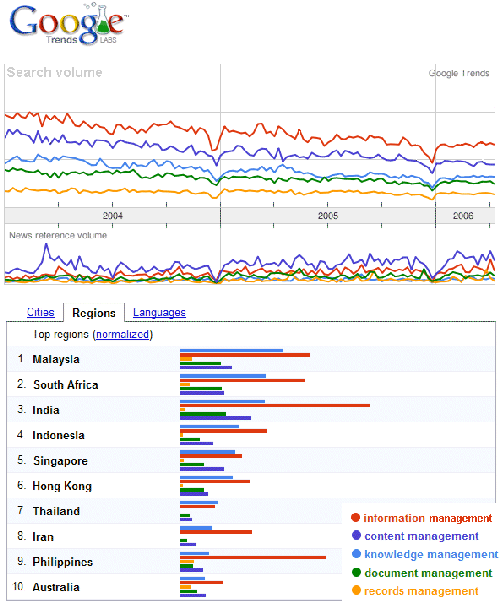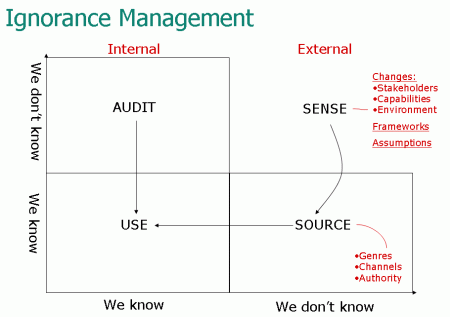May 23
Whose Language is it Anyway?
The TaxoCoP community on Yahoo Groups had a hilarious discussion recently (neatly summarised by Stephanie Lemieux) about vendors hijacking hot terms (like taxonomy, ontology) when they don’t really understand what they mean, and then proceeding to build shelfware around them (shelfware because they’ll be completely unusable and remain on the shelf).
More insidious is the way such hijacking sinks into professional discourse and takes on a whole new invented meaning. Take “ontology”. When I studied philosophy “ontology” was the study of things, being-ness. Now, in IT parlance, it means the description of relationships between things. No harm in that, if only they would add disclaimers and at least show some decent awareness of pre-existing meanings of the term.
May 19
KM and Christmas Don’t Mix
David Gurteen took a recent look at the new Google Trends tool, and noted the dominance of Asia and developing countries in searches for the topic “knowledge management”. I got interested and decided to dig deeper.
The tool will tell you the proportion of searches for a particular search string, relative to the total number of searches from that country/city/language group. So here’s the tidied up results table for comparing knowledge management, information management, records management, document management, content management. (Try the same search yourself by clicking here).

May 17
Pollard’s Nine Capacities for Enterprise 2.0
Just came across this post by Dave Pollard, outlining nine capacities that the internet needs to evolve in Web 2.0. “In order to be truly workable, to be not only a place for fascinating discovery but a place for changing the world, the Web needs to evolve nine capacities that it currently promises but does not really deliver.”
1. The capacity to focus attention on what’s important
2. The capacity to suggest practical action
3. The capacity to enable self-managed networks, exchanges and peer production
4. The capacity to enable self-directed education
5. The capacity to reveal deliberately-hidden truths
6. The capacity to drive and disseminate innovations
7. The capacity to embrace complexity
8. The capacity to provide trust, equitable access and participation in all its offerings
9. The capacity to be simple and intuitive to use
Meant as a manifesto for the web, why shouldn’t this also be a manifesto for the enterprise? And if Web 2.0 does develop tools to enable these capacities, let’s bring them behind the firewall fast! Lord knows the big structured KM systems we buy now are struggling with 1-3, and hopeless at the rest. It’s not the big systems we need, but skills in our IT folks, to become good at assembling simple, flexible and interoperable tools, in support of these nine capacities.
May 15
Introducing the Rumsfeld Ignorance Management Framework
A couple of weeks ago I wrote about Donald Rumsfeld’s contribution to ignorance management. This past week I’ve been working with a client in Rome on ways of improving their sensitivity to their external environment, and I’ve been using what I call the Rumsfeld Ignorance Management Framework. It’s turned out to be pretty useful, so I thought I’d share it here.

May 11
CKO, CIO, Director of Knowledge Management - Will the KM Strategist Please Stand Up?
As a KM consultant, it is heartening to step into an organisation that already has dedicated resources to drive KM. What happens though when you have a CKO, a CIO and a Director of KM all existing in different line functions of that one and same organisation? Who should drive the KM strategy? Who should drive the KM implementation? How do we delineate roles without making them so contained, they compromise effectiveness? Any thoughts?
I have read several articles and reports on the roles of the CKO, CIO and CKO vis a vis CIO. When you have a third entity of a Director, KM, though, things get a teeny bit complicated. It is not that I am averse to having so many drivers in an organisation for a KM/IM cause, but it is not merrier, the more. My experience had led me to see that when one party drives planning and another drives implementation, the picture never turns out as pretty as everyone “originally” imagined. The “original” picture as everyone would soon realise was different to begin with in everybody’s minds. Call me a classicist but I think initiatives work out better when there is a stable driving force from start to finish, from planning to implementation.
The water is this glass is, we get to propose!
May 02
Self-Governance and Self-Empowerment: A Lesson from Children?
Last evening, I happened to find out that the group of 7- and 8-year olds on my son’s school bus had used self-governance and self-empowerment for good intent.
For a long time, I had heard complaints from my own 8-year old that “so and so” was naughty on the bus, “so and so” spilled drinks on the bus, and so (and so) on. I’m sure he has been no angel either. When my son told me last evening that it was his turn to bring 3 sweets in on Thursday, I naturally asked why. He said it was for the boys on the bus. It turns out that the boys had made what to me was a “collective agreement” to award a sweet each to the 3 most quiet boys on the bus. The boys tooks turns to bring the sweets in, having drawn a slip from a tumbler to decide which day was their turn. I asked Andre who decides who gets the sweets and he said “the boy who brings the sweets that day can decide … so every boy can decide on one day” meaning every boy gets a chance to decide on some day. I have yet to ask the bus driver if things have improved on the bus but I reckon it would have for if Andre is anything to go by, the children like the friendly competition, to remain as quiet as possible on the bus and be rewarded by another child. Never have I been given so much advance notice about something he has bring in to school! I guess he is looking forward to Thursday when he gets to decide on the 3. The boys like being the judge and the judged. I am quite amazed by the structure that these little children have created, including the self-governance and self-empowerment, from just a ride on the school bus.
Is there a lesson here that can be applied to teams? How can teams empower and govern themselves to achieve better results without having to rely on external rewards and recognition?
Apr 28
KRIMinal Activities Afoot
We’ve been doing a lot of work recently with Marita Keenan on the interface between knowledge management, information management and records management. We call it KRIM for short : )
There are all sorts of important connections that KM, IM and RM purists miss if they don’t talk to each other: for example when buying document management systems, installing portals, designing taxonomies, changing their information management or content management policies, designing knowledge management policies around sharing. In one organisation I know, the KM team was well on their way towards finishing a new KM policy focused on promoting sharing, when they discovered that another department had just got a new information security policy approved by the CEO – directly contradicting some central elements of the KM policy.
Now I note that APQC is picking up the theme with a new benchmarking study on “Knowledge and Records Management: Navigating Compliance in the Face of e-Discovery” (thanks Ron).
We’re in the early stages of planning a Forum on this topic together with Marita (in Perth) and John O’Brien and Robert Tornack (in Hong Kong) later in the year. Drop me a line if you’re interested. plambe-at-straitsknowledge.com
Apr 28
Trinitarian Blogs on the Rise
What’s with the recent rise of trinitarian blogs in KM circles? Are blogs becoming more collaborative and less soap-boxy? We’ve admired Anecdote’s blog (Shawn, Mark and Andrew) for almost a year now. Tom Davenport, Don Cohen and Larry Prusak have their blog at Babsonknowledge.org. Paolina, Edgar and myself have just started up at a refurbished Greenchameleon.com. In January Valdis Krebs, June Holley and Jack Ricchiuto launched Networkweaving.com. The Power of Three is on the rise…
Apr 28
Ignorance, Fear and Knowledge Management
Donald Rumsfeld is credited with this legendary remark back in February 2002:
“...as we know, there are known knowns; there are things we know we know. We also know there are known unknowns; that is to say we know there are some things we do not know. But there are also unknown unknowns - the ones we don’t know we don’t know.”
It was unscripted, and raised a storm of ridicule, winning for him a ”Foot in the Mouth Award“ and starting a satirical cult around his “existentialist” philosophy. (Catch a preview here).
I have to admit I felt a bit like a nerd among raucous jocks when the laughter about Rumsfeld’s remarks became loud and noisy… because his comments are actually unusually profound, and I’ve been thinking about ignorance management as an aspect of knowledge management for several years. (Confucius said something pretty similar, but I’m not sure how many people laughed at him).
My nervousness about advertising this was assuaged by a recent discussion on ACT-KM about ignorance management - I wasn’t alone in the room with Rumsfeld, after all, and other people were taking ignorance seriously too.
Apr 28
Email: Trustworthy, Multipurpose, Overwhelming
We’ve been thinking a lot about email recently, kicked off initially by Andrew Mcfee’s recent MIT Sloan Management Review piece Enterprise 2.0 on the use of social software such as blogs and wikis within organisations (thanks Maish). His piece sparked off a debate of viral proportions, summarised neatly here (thanks James via Maish).
Mcfee points out that knowledge work is primarily done through two types of technology: channels (communication technologies such as email, messaging, telephone) and platforms (such as intranets, document management systems, portals, fileservers). He quotes Tom Davenport’s research to show that email is the master of the universe so far as knowledge work is concerned, and content based platforms almost insignificant by comparison.
At the same time, this mish mash of activities (communicating, instructing, informing, influencing, arguing, negotiating, sharing, attaching, collaborating, coordinating, enclosing, referring, announcing, copying, demonstrating political alliegances etc etc) intermingling functional work, content sharing and communication, in an almost entirely unstructured, unmanaged and irretrievably idiosyncratic way, makes email both confusing and overwhelming.
